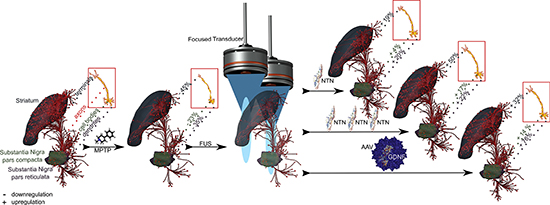Focused ultrasound researchers at Columbia University recently published a paper that is garnering attention in the scientific community and beyond. Available in the Journal of Controlled Release, the group led by Elisa Konofagou, PhD, described their groundbreaking preclinical work using focused ultrasound to deliver targeted gene therapy across the blood-brain barrier (BBB) to restore important nerve pathways that are damaged in Parkinson’s disease.
 Although clinical use of focused ultrasound is now being used to treat some motor symptoms caused by Parkinson’s disease (FDA approved in 2018), gene therapy is rapidly become a promising option for actually treating the underlying cause and perhaps even curing the disabling disease. The goal is to repair the damaged nerve cells so they can produce sufficient amounts of dopamine, which is depleted in Parkinson’s patients. In other words, gene therapy works to provide the brain with the ingredients needed to heal the areas damaged by Parkinson’s.
Although clinical use of focused ultrasound is now being used to treat some motor symptoms caused by Parkinson’s disease (FDA approved in 2018), gene therapy is rapidly become a promising option for actually treating the underlying cause and perhaps even curing the disabling disease. The goal is to repair the damaged nerve cells so they can produce sufficient amounts of dopamine, which is depleted in Parkinson’s patients. In other words, gene therapy works to provide the brain with the ingredients needed to heal the areas damaged by Parkinson’s.
Focused ultrasound is the essential tool that allows researchers to effectively and efficiently get the ingredients to the cells that need them. It’s noninvasive and delivers the healing gene therapies only to the areas where they are needed and in amounts that are effective.
“We found both behavioral and anatomical neuronal improvements in the brain,” said Dr. Konofagou, Professor of Biomedical Engineering and Radiology (Physics) at Columbia Engineering. “This is the first time that anyone has been able to restore a dopaminergic pathway with available drugs at the early stages of Parkinson’s disease. We were able to curb the rapid progression of neurodegeneration while improving the neuronal function. We expect our study will open new therapeutic avenues for the early treatment of central nervous system diseases.”
Besides Columbia University, other research groups are also pursuing ideas for neurological repair with genes, growth factors, stem cells, and neuroprotective or neurorestorative drugs. Investigations are underway at the University of Virginia and Johns Hopkins University, the University of Maryland, and Chang Gung University in Taiwan. Furthermore, the Columbia University group is also collaborating with HM Puerta del Sur in Madrid and Institut Langevin in Paris to study anti-alpha synuclein antibodies. To read more about each of these projects, view the Foundation’s summary document on Parkinson’s disease.
“Dr. Konofagou’s elegant preclinical work is paving the way for translation to human experiments,” said Kelsie Timbie, PhD, the Foundation’s Scientific Programs Manager. “Her research ties in nicely with that of other laboratories investigating novel gene therapy delivery systems.” See related story >
According to the Parkinson’s Foundation, nearly one million people will be living with Parkinson’s disease in the US by 2020, which is more than the combined number of people diagnosed with multiple sclerosis, muscular dystrophy, and Lou Gehrig’s disease (Amyotrophic Lateral Sclerosis). Approximately 60,000 Americans are diagnosed with Parkinson’s each year, and more than 10 million people worldwide are living with the disease. The incidence of Parkinson’s disease increases with age, but about four percent are diagnosed before age 50 with men being 1.5 times more likely to have Parkinson’s disease than women.
See related workshop summary: October 2018 BBB Opening and Parkinson’s Disease Workshop Summary.
See Research News for Another Story on Gene Therapy for Parkinson’s
Media coverage of this study includes articles in Medical News Today, Medical Device Network, Technology Networks, and more.
